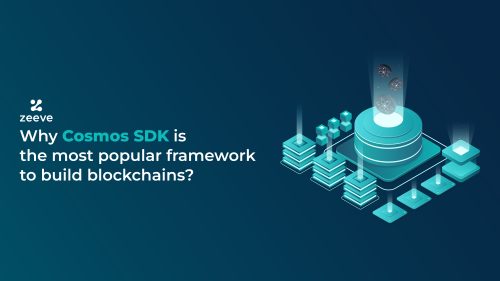
Why Cosmos SDK is a powerful framework to build custom blockchains
Blockchain continues to be adopted on a large scale as more enterprises realize blockchain’s exceptional ability to increase trust, security, transparency, and traceability across business networks. However, the process of building a blockchain network from scratch is a challenging task. THE Cosmos SDK framework simplifies the blockchain development process with tools, ready-to-use libraries, and ready-to-use modules.
With the ever-expanding Cosmos ecosystem, Cosmos SDK is widely used as a most popular and highly feasible framework to build custom blockchains to power business-specific use cases. Cosmos SDK is extremely popular, but new enterprises and developers often need to know the unique attributes of Cosmos SDK that make it one of the most-used frameworks. Thus, this article dives deeper into Cosmos SDK and explains its important aspects.
Overview of Cosmos SDK Framework
Cosmos SDK is an open-source blockchain framework by Cosmos Network that enables hassle-free development of high-value public and permissioned blockchains with a Proof-of-Stake, Proof-of-Authority (PoA) consensus mechanism.
For example, you can build a PoS blockchain like Cosmos Hub with a custom token model, on-chain governance, and validators. On the other hand, Cosmos SDK can be used to build an application-specific blockchain like Cosmos Zone to power a single app. As required, you can use Cosmos SDK framework to build other blockchain use cases such as decentralized exchange, DeFi dApps, and decentralized marketplaces. These single-use blockchains are generally known as application-specific blockchains or AppChains that are built on top of Tendermint.
Heterogeneous blockchains built with Cosmos SDK can interact with the rest of Cosmos blockchains via IBC- Inter-Blockchain Communication protocol. All the SDK-based blockchains are developed from composable modules that are open sources and can be easily available for web3 developers to use. Based on the architecture and technical requirements of the blockchain network, new modules can be created, while the integration of existing modules really is quick and simple.
Want to learn more about how Cosmos is empowering custom blockchain or application-specific blockchain development? Read our detailed guide below:
Cosmos Empowering Enterprises through Application-specific blockchains
Application architecture of Cosmos SDK Framework
The applications architecture of the Cosmos SDK framework consists of Modules’ and ‘Directories’ to facilitate the development of custom blockchain and Cosmos dApp. Following is the list of important modules and directories that are readily available to developers:
Important modules of the Cosmos SDK include:
- Auth: defines the standard account structure (BaseAccount) and supports the authentication of transaction signers.
- Bank: responsible for enabling smooth crypto transfer.
- Governance: handles all the governance-related functionalities like community-led proposals and voting.
- Staking: Allows implementation of Proof of Stake to enable bonding and delegation of transactions.
- IBC: responsible for enabling the interoperability of blockchain zones through the IBC Protocol specifications.
Important directories of the Cosmos SDK include:
- Baseapp: define a template for ABCI application so that Cosmos-SDK based blockchain can utilize underlying Tendermint node.
- client: Provides CLI and REST server tooling.
- server: RPC server to enable communication with the node and network.
- examples: Provide examples of building working standalone applications.
- store: contains the code for the multistore (i.e., state).
- types: common types needed for SDK-based application development.
- x (for eXtensions): The folder to store BaseApp modules along with already-built modules available on the Cosmos ecosystem.
What makes Cosmos SDK one of the most used blockchain frameworks?
Cosmos SDK is widely known as the most advanced blockchain framework for building custom blockchain to power use-case specific applications. Following are a few reasons that justify its popularity:
Great ease in building blockchains
Building a blockchain with Cosmos SDK is simple. For example, developers can connect the state machine with the Cosmos’s underlying consensus engine via Application Blockchain Interface (ABCI), and continue development in any programming language. Note that Cosmos SDK typically supports development in Golang— a highly preferred language across the web3 developer community. Further, Cosmos SDK enables the automatic execution of codes to trigger logic automatically at the beginning of each block. All these developer-focused arrangements bring ease to developers, helping them complete their projects in less time and without complexities.
Open Source blockchain framework
Cosmos SDK is designed to be open-source, which allows developers of all levels to collaborate with the worldwide developer community and accomplish their desired blockchain project. All the evolving modules, directories, tools, libraries, source code, and developers’ documentation are accessible to everyone.
Maximum flexibility in development
The Cosmos SDK framework allows for endless customization in any Cosmos SDK-based blockchain. For example, Blockchain nodes in the Cosmos blockchain or application-specific blockchain include a state-machine. Developers building this state with Cosmos SDK are free to define and modify the state, transaction type, and state transition functions to meet the specific use case requirements. At any point, developers can tweak the blockchain infrastructure to optimize it for a different use case, such as gaming applications, DeFi, supply chain solutions, and more.
Cross-blockchain interoperability
Cosmos SDK is a standardized development toolkit that allows developers to build custom blockchains as ‘Zones’. These Zones are interconnected through IBC– Inter-Blockchain Communication (IBC) protocol. IBC enables unique, parallel blockchains to communicate and transact with each other seamlessly. With this interoperability benefit, Cosmos SDK opens up a whole world of possibilities, allowing data, tokens, assets, and logic to be transferred across multiple blockchains in a highly secure and trustless way. By facilitating cross-chain communication, the Cosmos SDK fosters a vibrant ecosystem where various blockchains can collaborate and share resources, ultimately enhancing the overall efficiency of the decentralized landscape.
Unparalleled security
Security on Cosmos SDK-based blockchains is maintained through the following important implementations:
Applications running on Cosmos SDK-based blockchains are protected against malicious modules through access control firewalls so that developers can focus on other important aspects of their application and forget any threat to security.
> Developers can build custom blockchain or application-specific blockchains using the Go programming language, which is a highly matured and secure language.
> Cosmos SDK framework allows developers to choose custom cryptographic functions and a complete set of well-audited libraries so that ease and uniqueness are maintained.
> As Cosmos SDK-based blockchains are independent, they do not get affected by any bugs or vulnerabilities of the underlying blockchains; thus security remains intact at various levels.
Composable modules
Cosmos SDK offers a range of combat-proven modules to customize your blockchain based on ecosystem-specific requirements. Staking & Slashing modules, Auth and Bank, and Governance are some of the important modules that are used to add basic functionalities to any blockchain. However, with the growing ecosystem of Cosmos SDK modules, more modules continue to add, making the development of even more complex applications an easier task.
Default consensus engine
Tendermint Core is the default consensus engine of Cosmos SDK, which is considered a highly matured and widely used BFT consensus for building Proof-of-Stake blockchains. However, developers can choose to implement any novel consensus engine like CometBFT to achieve considerable gains in throughput, performance, and security.
Sovereignty
Cosmos SDK framework allows for the creation of application-specific blockchains that operate a specific application. Hence, network stakeholders maintain full control of the entire blockchain. They can have their own set of validators, which are responsible for maintaining the blockchain’s state and modifying the governance rules as required. Proposals for the network upgrades can be done through the integration of governance modules available in the Cosmos SDK.
In line with all these features, Cosmos SDK is popular as it facilitates blockchain development in the following three simple steps:
- Composing the custom blockchain: Developers can compile the custom blockchain with the pre-built modules available in the Cosmos SDK framework and by implementing their own custom modules.
- Launching the blockchain: This stage requires enterprises to test the MVP, get the feedback, make necessary modifications, and then launch the public mainnet.
- Connecting the chain to other blockchains: By connecting your blockchain with other chains, you improve the adoption, liquidity, and overall capabilities of the network.
Cosmos SDK Framework: use cases and examples
Cosmos SDK framework allows you to build use cases for industries spanning open finance, web3 gaming, healthcare, prediction markets, real estate, government sectors, cross-border payments, and a lot more. Regarding the project examples; the Cosmos ecosystem is constantly expanding with more web3 enterprises, individual developers, and blockchain startups building innovative and highly feasible projects with the Cosmos SDK, including the following:
Cosmos Hub
Comos Hub is the first Proof-of-Stake blockchain network built with Cosmos SDK framework that has its native token- ATOM, validator set, and all the necessary components like wallets, explorers, CLI, etc. The blockchain acts as a center point to connect all blockchains within the Cosmos ecosystem, thereby maintaining interoperability.
Binance Smart Chain
Binance Smart Chain is created as an extension of Binance Chain, which runs as a parallel blockchain. BSC is widely popular for its dual-chain architecture, which allows for developing decentralized apps and custom digital assets. Also, users can benefit from the architecture’s fast trading ability to invest and exchange cryptos.
Kava
Kava is a DeFi platform designed using the Cosmos SDK to bridge the gap between real-world finance and the cryptocurrency ecosystem. The platform offers a range of DeFi products and services to support seamless and secure crypto lending, trade, and investment-related operations to be done in a purely decentralized manner. With KAVA as its native token, Kava manages its Governance and allows validators to maintain decentralization on the platform.
Launch your Cosmos SDK-based blockchain with Zeeve
Building a blockchain with the Cosmos SDK framework is easy, but managing a whole blockchain ecosystem is challenging. You have to manage wallets, explorers, and a set of nodes– including full nodes and validator nodes.
Zeeve offers a reliable infrastructure to build and deploy your Cosmos SDK based blockchain while managing all the ecosystem-related complexities such as customizing the modules, integrating white-labeleed explorer and faucet, and getting a data indexing protocol ready with Subgraphs. With us, you can instantly launch a custom blockchain with plug-and-play developer tools, in line with Cosmos-specific technologies like IBC and Tendermint.
For more information on how Zeeve can simplify your Cosmos SDK-based development journey, connect with our consultants or schedule a quick call to discuss your project requirements in detail.



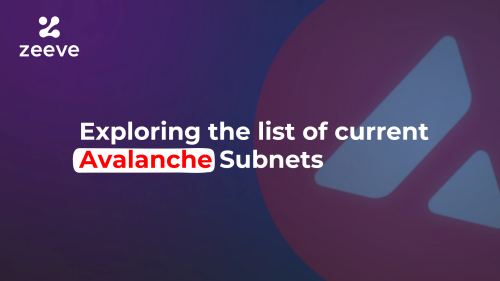
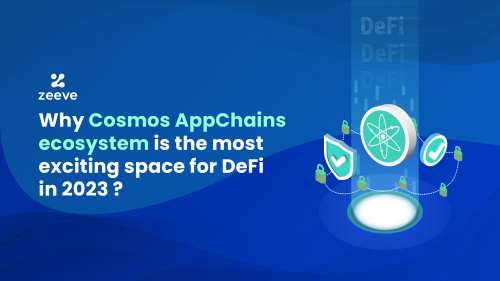
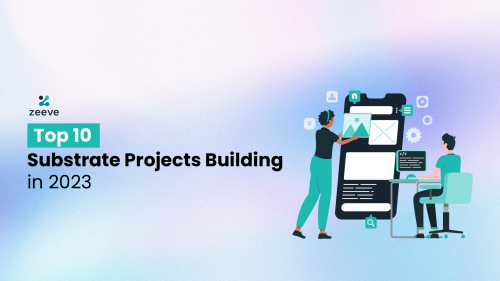
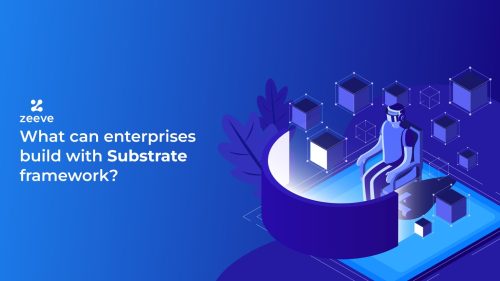
Responses